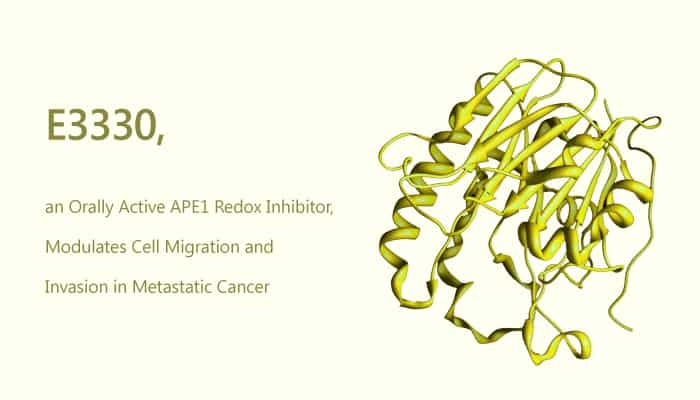AP endonuclease 1 (APE1; also known as REF-1) is a dual-function protein. It contains a redox domain and a DNA repair domain. Several human cancers overexpress APE1. Disruption of APE1 function has detrimental effects on cancer cell viability. Furthermore, APE1 implicates in the transactivation of numerous seminal transcription factors involved in cancer initiation and progression, including activator protein-1, NF-κB, HIF-1α, cyclic AMP response element-binding protein, etc. In addition, APE1 plays a critical role in hypoxia-induced HIF-1α-mediated up-regulation of the angiogenic growth factor, vascular endothelial growth factor, in pancreatic cancer. E3330 is a small-molecule inhibitor of AP endonuclease 1 (APE1/ REF-1) redox domain function. It interrogates the functional relevance of sustained redox function in pancreatic cancer. In this study, E3330 significantly reduces the growth of human pancreatic cancer cells in vitro.

E3330 is a direct, orally active AP endonuclease 1 inhibitor. It suppresses NF-κB DNA-binding activity. E3330 also blocks TNF-α-induced activation of IL-8 production in liver cancer cell lines.
Western blot analyses six human pancreatic cancer cell lines. All pancreatic cancer cell lines express APE1 protein at a considerably higher level than the nonneoplastic human pancreatic cell lines. Inhibition of APE1 redox function inhibits the growth of human pancreatic cancer cell lines. However, it does not inhibit nonneoplastic human pancreatic epithelial cells. E3330 inhibits the In vitro growth of primary pancreatic cancer cells. Besides, it does not induce G1 or G2 arrest but rather promotes the exit of the cell cycle of PANC1 cells.
E3330 significantly inhibits the migration of pancreatic cancer cells. It inhibits CD44 expression on the surface of pancreatic cancer cells.
In summary, E3330 shows good anticancer properties. It inhibits cancer cell growth and migration.
Reference:
Zou GM, et al. 2008 Jul;7(7):2012-21.